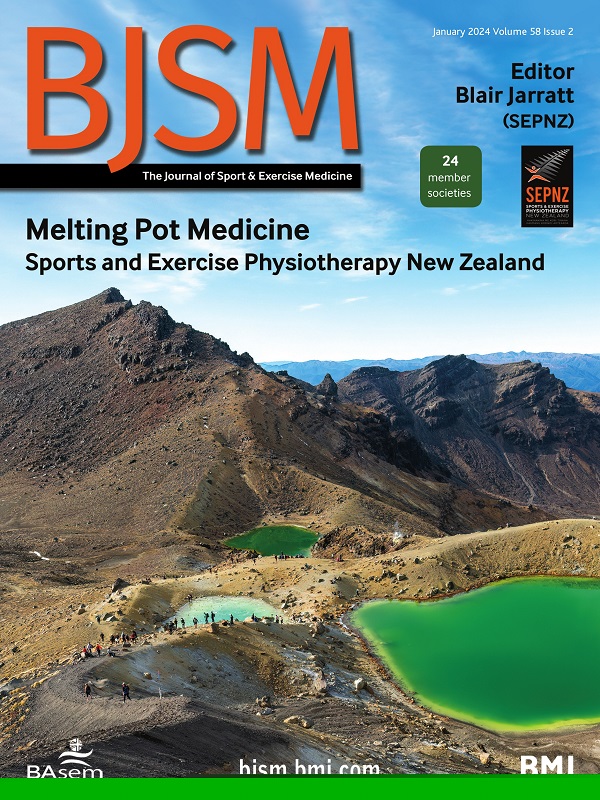奥运会和残奥会教练心理健康求助障碍的感知:概念图研究
IF 11.6
1区 医学
Q1 SPORT SCIENCES
引用次数: 0
摘要
目的调查奥运会和残奥会教练员心理健康求助的相关问题。这项研究还试图确定哪些挑战是最重要和最可行的。方法采用混合方法的群体概念作图方法。在回答“奥运会或残奥会教练寻求心理健康帮助的困难之处是什么?”这一问题时,参与者进行了头脑风暴,(分成小组)并以5分李克特量表(Likert scale)对陈述进行了重要性和可行性评分。19名奥运会教练、残奥会教练和心理健康专业人员参加了这项研究。结果参与者头脑风暴了68个独特的陈述。按重要性排序,确定了10组核心挑战:(1)高水平运动环境中的压力和不稳定性,(2)与心理健康求助相关的耻辱感,(3)缺乏对自身心理健康护理的优先考虑,(4)缺乏寻求心理健康支持的环境安全,(5)缺乏足够的心理健康素养,(6)时间限制,(7)管理角色相关压力的期望,(8)对心理弹性的误解,(9)缺乏获得心理健康支持的途径,(10)不愿与心理健康从业者接触。“缺乏足够的心理健康素养”和“高水平运动环境中的压力和不稳定性”分别被评为最可行和最不可行的挑战。虽然具有高可行性的动态个人因素可能提供短期解决方案(例如,心理健康素养),但体育组织应优先消除阻碍教练寻求帮助的文化嵌入式障碍。教练员和心理健康专业人员因其独特的视角,应在教练员心理支持的开发中发挥积极作用。如有合理要求,可提供资料。本文章由计算机程序翻译,如有差异,请以英文原文为准。
Olympic and Paralympic coaches’ perceived barriers to mental health help-seeking: a concept mapping study
Objectives To investigate challenges associated with mental health help-seeking among Olympic and Paralympic coaches. The study also sought to identify which challenges were most important and feasible to address. Methods The study employed a mixed-methods group concept mapping methodology. Participants brainstormed, sorted (into groups) and rated (for importance and feasibility) statements on 5-point Likert scales in response to the prompt, ‘What makes it challenging for an Olympic or Paralympic coach to seek help for their mental health?’. Nineteen Olympic coaches, Paralympic coaches and mental health professionals participated. Results Participants brainstormed 68 unique statements. Ranked by importance, 10 core clusters of challenges were identified: (1) pressures and instability within high-performance sports environments, (2) stigma associated with mental health help-seeking, (3) lack of prioritisation for own mental health care, (4) lack of environmental safety to seek mental health support, (5) lack of adequate mental health literacy, (6) time constraints, (7) expectations to manage role-related pressures, (8) misconceptions about mental resilience, (9) lack of access to mental health support, and (10) hesitance to engage with mental health practitioners. A ‘lack of adequate mental health literacy’ and ‘pressures and instability within high-performance sports environments’ were rated the most and least feasible challenges to address, respectively. Conclusion While dynamic individual factors with high feasibility may offer short-term solutions (eg, mental health literacy), sports organisations should prioritise eliminating culturally embedded barriers deterring coaches from seeking help. Considering their unique insights, coaches and mental health professionals should play an active role in developing psychological supports for coaches. Data are available upon reasonable request.
求助全文
通过发布文献求助,成功后即可免费获取论文全文。
去求助
来源期刊
CiteScore
27.10
自引率
4.90%
发文量
217
审稿时长
3-8 weeks
期刊介绍:
The British Journal of Sports Medicine (BJSM) is a dynamic platform that presents groundbreaking research, thought-provoking reviews, and meaningful discussions on sport and exercise medicine. Our focus encompasses various clinically-relevant aspects such as physiotherapy, physical therapy, and rehabilitation. With an aim to foster innovation, education, and knowledge translation, we strive to bridge the gap between research and practical implementation in the field. Our multi-media approach, including web, print, video, and audio resources, along with our active presence on social media, connects a global community of healthcare professionals dedicated to treating active individuals.

 求助内容:
求助内容: 应助结果提醒方式:
应助结果提醒方式:


